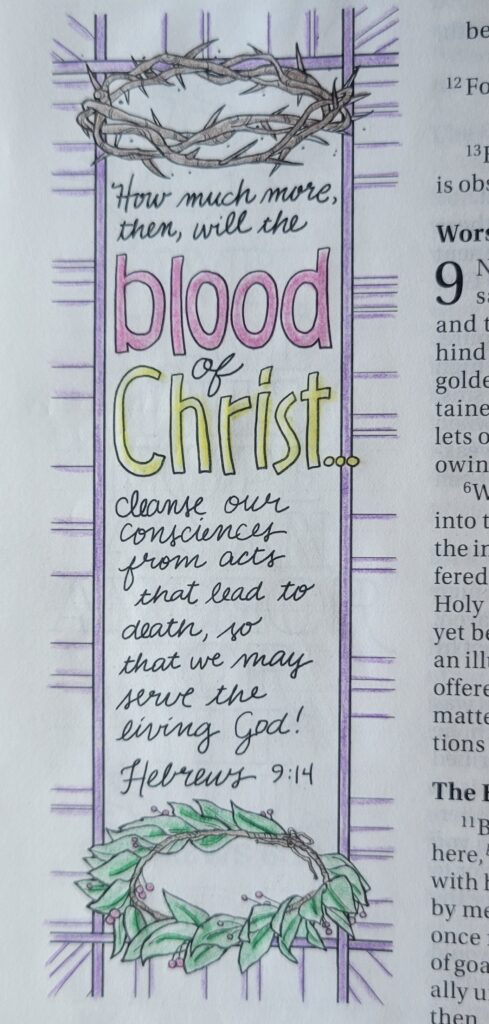There are times when we feel that the suffering is simply too much. We cannot understand why God would allow us to go through such intense challenges when we are doing our best to follow Him. We want to remain faithful, but our circumstances seem so hopeless. I have been in this place at different times of my life. My PPD after Eliam was born was one of those times. Everything was hard, and I didn’t know how to suffer righteously. In many ways, I suffered very unrighteously.
This post is a two week exegetical and expository study of the book of Hebrews. The sermons walk through how the Jewish Christians of the early church were suffering tremendously. Their temple had been destroyed, and they were under intense persecution, many losing their lives or families for their faith. The author of Hebrews (whomever she may be) takes them through a journey of explaining the better covenant under which they live and the ways that can give them strength and perseverance to endure their current suffering. The applications to our lives today are endless and much better explained by reading the book as a whole rather than individual verses.
While you are free to use these links any way that works for you, I am providing one possibility. Start your quiet time for that day by reading the verses listed and write some thoughts, responses and questions. Then listen to the linked sermon. When you have finished the whole series, the following day listen to the entire book on the Bible app to hear it similarly to the way it may have been read annually.
Don’t skip any of the lessons. Each builds on the other as they walk through the whole book. The lessons on suffering begin in “A Better Moses,” but the previous lessons are important to understand before you get there. Most of the reading is from the NIV, but there are a few ESV ones if the translation sounds a little different.
I recommend choosing 3-5 verses to say out loud each day, throughout the day. This will be most effective if you do it every time you eat (or at some other reminder that happens multiple times a day like getting on the elevator or picking up your phone. Say the same verses every day for two weeks, and you will have them memorized when you are done. You can pick any that you like, but if you do not know what to pick I suggest Hebrews 11:38-12:3.
NB: The preachers mention a podcast several times. During my first listen through this sermon series, I had the podcast links next to the video links, but I can no longer find those. I will update with those links if I do. Also, if you find links on this page that do not work, please let me know. I want to keep them up to date.
Day 1: Read the book of Hebrews without any commentary. Get familiar with it. Take notes, and begin meditating on the words.
Day 2: Hebrews 1:1-2:4 – “A Better Messenger” (36:15) This sermon goes over the context of the book of Hebrews and walks through the first chapter. My favorite quotation: “We don’t know who wrote Hebrews, but whoever it was, she was brilliant.”
Day 3: Hebrews 2:5-2:18, Psalm 22 – “A Better Humanity” (42:40) This sermon discusses how Hebrews was written to people who are suffering, people who are facing tragedy. It also talks about Jesus’ life psalm and why He quoted it on the Cross.

Day 4: Hebrews 3 – “A Better Moses” (36:20) This sermon begins the earnest discussions of suffering and had some great quotations:
- “Don’t lose sight of the dental floss.”
- “Hanging out in God’s community invites us to endure, no matter the storm.”
- “The opposite of suffering well is rebellion.”
Day 5: Hebrews 3:16-4:13, Psalm 95 – “Sabbath Rest” (36:56) Favorite quotations:
- The gospel is more than just salvation.
- We don’t have to freak out when bad things happen.
- We are allowed to have Sabbath rest today, even when our lives look like a train wreck.
Day 6: Hebrews 4:14-5:14, Psalm 2, Psalm 110 – “A Better High Priest” (32:15) In Jesus’ reverent submission, He doesn’t save Himself – He prays for others. The infographic they discuss is here, and Day 13 will be an entire day studying it to understand the connections.
Day 7: Hebrews 5:11-6:20 – “Elementary Teachings” (41:47) The Elementary Teachings are about how I live my life, and it does not matter what I believe if I am not living the way God commanded. Favorite quotations:
- “It’s spiritual abuse to live the way you want to live and then use the Bible to hammer your children.”
- “I can’t just talk about forgiveness. I have to be really good at it.”
Day 8: Hebrews 7:1-8:2 – “The Order of Melchizedek” (33:42) We have a high priest who can intercede for us and will do so forever.
Day 9: Hebrews 8-9 – “A Better Covenant” (42:52) Something to consider during your reading of the passage that they do not discuss in the sermon: In this chapter, we find the longest quotation from the Old Testament in the New Testament. Why is it here? Why is it from Jeremiah? What are we supposed to learn from the larger context of where the quotation comes from?
Day 10: Hebrews 10, Psalm 40 – “He Sat Down” (34:01) This was an Easter sermon. Most of the videos fade at the end of the sermon, but this one has a song at the end. I highly recommend listening to and meditating on that song during your time with God.

Day 11: Hebrews 10:39-12:3 – “Let Us Run” (36:10) This is the sermon on the “Hall of Faith,” a famous passage so many of us are familiar with, and it encourages us to persevere through trials even when we cannot see the end. All of the people listed in this chapter continued to run their race, even though “none of them received what was promised.”
Day 12: Hebrews 12:14-13:25 – “Entertaining Angels” (37:18) Perseverance is not just about survival. I love the way he talks about the command to “encourage one another daily.” There are so many times that we can make that Scripture about being encouraged daily rather than encouraging other people.
Day 13: Infographic – After nearly two weeks in the book of Hebrews, spend time this morning going through this infographic in detail. See some of the larger connections in the book and the ways that the author (whomever she may be) used literary devices to communicate a message to the Jewish Christians at the time. Write down some of the larger lessons you have learned from the book as a whole.
Day 14: Listen to the book of Hebrews. I like to use the Bible App and let it read to me. If the book was written as an annual homily, listening to the entire book in a single sitting allows us to get closer to the way it was meant to be heard, especially with some of the new understandings we now have after a deeper study.